Index relies entirely on the support of donors and readers to do its work.
Help us keep amplifying censored voices today.
Hungarian journalist Tamás Bodoky founded the investigative news website Atlatszo.hu to promote a free press in Hungary, a country where journalists and news organisations face recently introduced media taxes, a proposed internet tax for citizens, smear campaigns and police-run office raids. Bodoky has brought together a range of crowd-sourced approaches to empower citizens in the face of this deteriorating situation for human rights, including tools to allow for anonymous reporting of corruption, to help investigate freedom of information requests (and refusals), and MagyarLeaks, a Tor-based whistleblowing service. Last year Atlatszo.hu was put on the government’s NGO blacklist, but Bodoky continues to run the site, as well as workshops to help keep investigative journalism in Hungary alive. He is the recipient of the 2015 Index on Censorship Freedom of Expression Award for Digital Activism.
Atlatszo.hu is calling on all those who believe that the independence of journalism in Hungary is under threat. All those who agree that politics and business interests have sunk their claws into everyday life. All those who know that taxpayer money is vanishing. We are calling on you to help us let the world know the truth.
Almost four years ago Atlatszo.hu pledged to tackle the uphill battle represented by these challenges.
As a watchdog NGO for investigative journalism, we set out to promote transparency and freedom of information in Hungary.
Atlatszo.hu – “atlatszo” means transparent in Hungarian – produces investigative reports, accepts information from whistleblowers, files freedom of information requests, and commences freedom of information lawsuits in cases where those requests are refused.
We are only a small group of journalists, lawyers and IT-specialists. But since the beginnings we have won more than 60 percent of FOI lawsuits we initiated. In fact we have been so successful in the courtrooms that in 2013 the governing majority introduced a bill to curtail FOI legislation which was dubbed “Lex Átlátszó” by the Hungarian press.
Looking back to 2011, when Atlatszo.hu was founded, I remember that many journalists dismissed the effort and were quite sure it wouldn’t last. We ignored these critics. We were confident that this was the way to go; to position ourselves outside the mainstream media, and to seek out alternative communication channels — because all of the main journalistic platforms were and still are severely constrained.
In Hungary, domestic journalism has come to represent the interests of local oligarchs. Multinational media firms are busy appeasing the political and economic powers that be. The advertising sector is a powerful censorship instrument – too often used to exert pressure. And every year since we started, the situation has become dramatically worse.
Now, the ruling political elite is pushing out its full arsenal. From business regulation to media control. From forcing personnel changes to diverting media outlets by prescribing countless directions. State funded public media has been reduced to a propaganda tool.
Most recently, the Hungarian government sparked a row over the foreign funding of local NGOs. The row has escalated to the extent that even groups advocating simple environmental concerns, or campaigning against corruption, are now being targeted. The only tangible reason to be found is that the government doesn’t appreciate funding going to any organization it doesn’t fully approve of.
I look at all of this, I look at my country, and I say one simple thing. I say Atlatszo will not be defeated. Hungary can have a fair and just democracy. Yes, it still can be done.
Thank you.
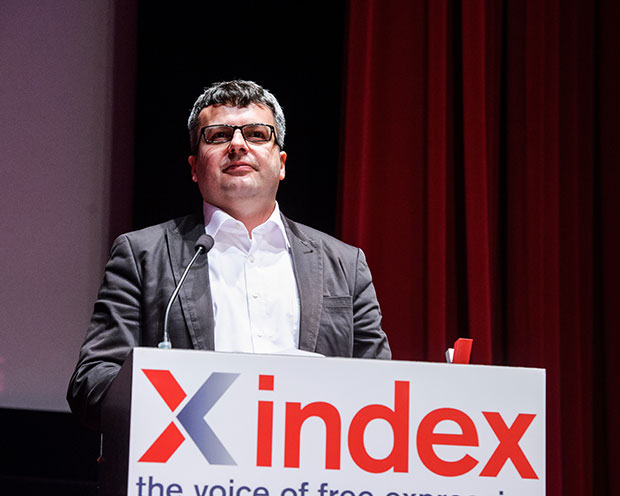
Journalist Tamas Bodoky (Photo: Alex Brenner for Index on Censorship)
Related
• Index announces winners of 15th annual Freedom of Expression Awards
• Safa Al Ahmad: Facts are a precious commodity in Saudi Arabia
• Rafael Marques de Morais: I believe in the power of solidarity
• Amran Abdundi: This award is for the marginalised women of northern Kenya
• El Haqed: I will fight for freedom, equality and human rights for ever
• Special Index Freedom of Expression Award given to persecuted Azerbaijani activists and journalists
• Video: Comedian Shappi Khorsandi hosts Index on Censorship awards
• Drawing pressure: Cartoonists react to threats to free speech
This article was posted on 18 March 2015 at indexoncensorship.org
A Kenyan woman speaking out for women in one of the world’s most dangerous regions and a female journalist who exposed an unreported uprising in Saudi Arabia are among the winners of this year’s Index on Censorship Freedom of Expression Awards.
“Our shortlisted nominees are all tackling direct and serious threats to stifle free speech,” said Index on Censorship CEO Jodie Ginsberg. “We were humbled and inspired by their stories, and their dedication to ensuring we can all speak freely.”
The awards were presented at a ceremony at The Barbican, London, hosted by comedian Shappi Khorsandi whose father Hadi was forced into exile from Iran because of his satirical writing.
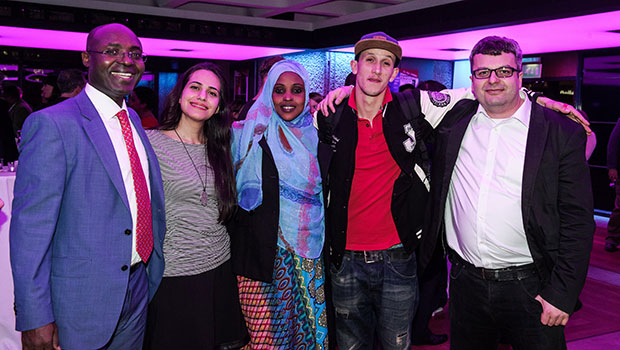
Index on Censorship 2015 Freedom of Expression award winners: Rafael Marques de Morais (journalism), Safa Al Ahmad (journalism), Amran Abdundi (campaigning), Mouad “El Haqed” Belghouat (arts) and Tamas Bodoky (digital activism) (Photo: Alex Brenner for Index on Censorship)
Awards are presented in four categories: journalism, arts, campaigning and digital activism. The winners were Saudi journalist Safa Al Ahmad and Angolan reporter Rafael Marques de Morais (journalism – jointly awarded); Moroccan rapper “El Haqed” (arts); Kenyan women’s rights campaigner Amran Abdundi (campaigning); and Hungarian freedom of information website Atlatszo (digital activism).
The crime of free expression
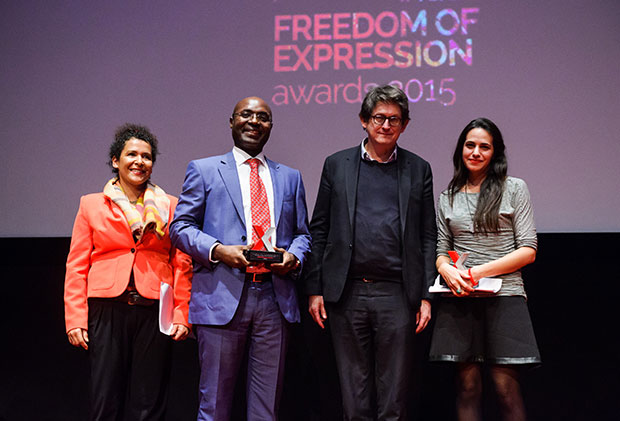
Journalist and campaigner Mariane Pearl, journalism award recipient Rafael Marques de Morais, Guardian editor Alan Rusbridger and journalism award recipient Safa Al Ahmad (Photo: Alex Brenner for Index on Censorship)
Al Ahmad was recognised for her documentary Saudi’s Secret Uprising, which exposed details of an unreported mass demonstration in Saudi Arabia. “Safa Al Ahmad dared to go into places that are difficult for women and for reporters, to bring that information back and share it with the world,” said Turkish author Elif Shafak, one of the five judges. Saudi Arabia is a mystery, even to its own people, said Al Ahmad in her acceptance speech: “Parts of our history is deliberately concealed, the present is muddled with rumours and half-truths. The government-owned and controlled media play a major role in the dissemination of those false realities of ourselves and others. This makes facts a precious commodity in Saudi Arabia.”
Angolan investigative reporter Marques de Morais has been repeatedly prosecuted for his work exposing government and industry corruption and will go on trial on 24 March charged with defamation. “Rafael is a very important individual doing very important work in a very, very difficult environment,” said judge Sir Keir Starmer QC. Marques de Morais dedicated his speech to the Zone 9 group of Ethiopian bloggers currently in jail “for the crime of exercising their right to freedom of expression”.
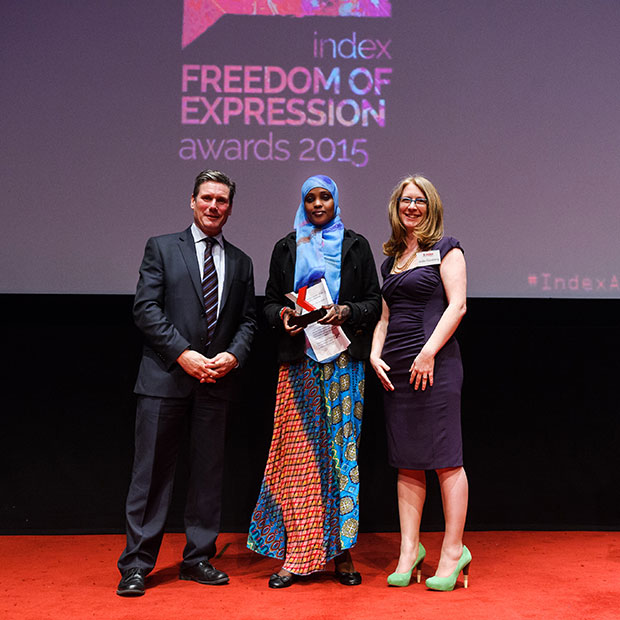
Doughty Street barrister Keir Starmer, campaigning award recipient Amran Abdundi and Index on Censorship CEO Jodie Ginsberg (Photo: Alex Brenner for Index on Censorship)
The winner in the campaigning category, Amran Abdundi, is a women’s rights activist based in north-eastern Kenya and runs a group helping women along the dangerous border with Somalia, where terrorism and extremist violence dominate. Judge Martha Lane Fox said: “Amran Abdundi was a standout candidate for me. She is doing something incredibly powerful in an unbelievably complicated and dangerous situation.” Abdundi dedicated her award to the “marginalised women of northern Kenya… who will now know that their struggles and their efforts to fight for their rights are being recognised internationally”.
Help us let the world know the truth
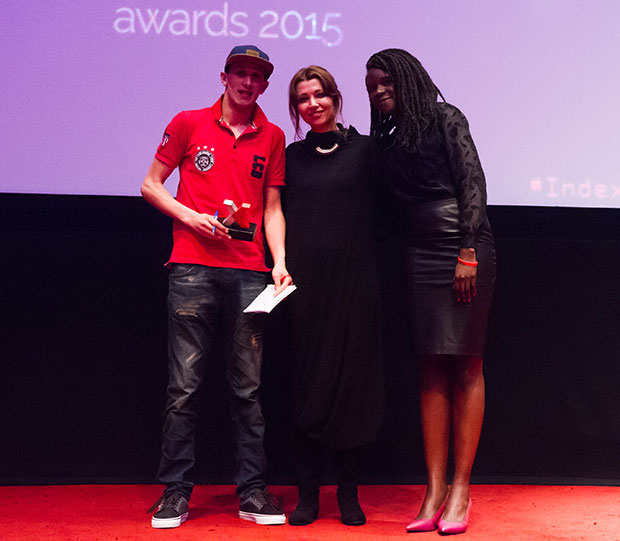
Arts category winner Mouad “El Haqed” Belghouat, novelist Elif Shafak and actor Stella Odunlami (Photo: Alex Brenner for Index on Censorship)
Arts category winner Mouad “El Haqed” Belghouat is a Moroccan rapper and human rights activist whose music highlights widespread poverty and endemic government corruption in Morocco. He has been imprisoned on spurious charges three times in as many years, most recently in 2014. Belghouat said in his acceptance speech: “I have been through difficult times: I was jailed, fired from my work, rejected by many friends. I am still forbidden to sing in my own country. But after all that I am still determined that I will never change my position. I will fight for freedom, equality and human rights for ever.” Lane Fox said Belghouat had taken his music and “translated it into a kind of online activism, but then, crucially, mobilised people in the street”.
The digital award, decided by public vote, went to Hungarian investigative news outlet Atlatszo.hu managed by Tamás Bodoky. The website acts as watchdog to a Hungarian government which has increasingly tightened its grip on press freedom in the country. Editor-in-chief Bodoky said Atlatszo.hu called on all those who believe that independent journalism in Hungary is under threat. “All those who agree that politics and business interests have sunk their claws into everyday life. All those who know that taxpayer money is vanishing. We are calling on you to help us let the world know the truth.”
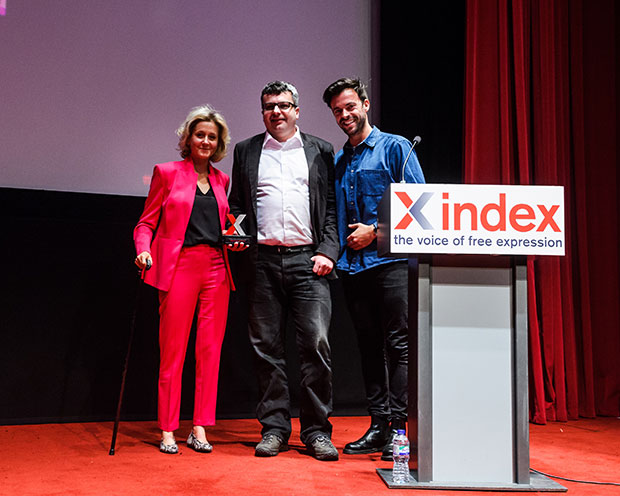
Entrepreneur Martha Lane Fox, digital activism award recipient Tamas Bodoky and actor Jolyon Rubinstein (Photo: Alex Brenner for Index on Censorship)
The awards were presented by the judges along with special guests including Guardian editor Alan Rusbridger.
A special award was also given on the evening to honour the many Azerbaijani journalists and activists jailed or forced into exile or hiding following a recent crackdown by the government. Former award winner and journalist Idrak Abbasov, who was forced to flee Azerbaijan last year, accepted the award on behalf of all those facing persecution in the country. “I call upon the world community to help Azerbaijan… so that our colleagues might be released and that our country might become a normal state in which we and others might live freely,” Abbasov told the audience in a video speech.
The evening featured an exhibition of specially commissioned cartoons by international cartoonists, reflecting on the past 12 months for free expression. Most of the artists had direct experience of persecution over their work, including Syrian political cartoonist Ali Ferzat – a former Index award winner – and Malaysia’s Zunar. “In the wake of the attacks on Charlie Hebdo, we wanted to pay homage to the work of cartoonists who are so often the first to face censorship in any move to stifle free expression,” said Index’s Jodie Ginsberg.
Related
• Safa Al Ahmad: Facts are a precious commodity in Saudi Arabia
• Rafael Marques de Morais: I believe in the power of solidarity
• Amran Abdundi: This award is for the marginalised women of northern Kenya
• El Haqed: I will fight for freedom, equality and human rights for ever
• Tamas Bodoky: The independence of journalism in Hungary is under threat
• Special Index Freedom of Expression Award given to persecuted Azerbaijani activists and journalists
• Video: Comedian Shappi Khorsandi hosts Index on Censorship awards
• Drawing pressure: Cartoonists react to threats to free speech
An earlier version of this article stated that Rafael Marques de Morais will go on trial on 23 March. The date is 24 March.
This article was posted on 18 March 2015 at indexoncensorship.org
Atlatszo.hu is an investigative news outlet founded and managed by Tamas Bodoky, the main goal of which is to promote free, transparent circulation of information in Hungary. The website, which receives around 500,000 unique visitors per month, acts as watchdog to a Hungarian government which has increasingly tightened its grip on press freedom in the country.
Atlatszo.hu produces investigative reports based on FOI requests, and instigates FOI lawsuits in cases where its requests are refused. In 2014, it has uncovered cases of state control of the media, election fraud, government corruption, tax fraud, and misuse of public funds.
Hungarian prime minister Viktor Orban, who announced intentions to build an “illiberal state” in summer 2014, has in the past year overseen the unexplained dismissal of a news editor who revealed expenses fraud within the government, and the introduction of new media taxes designed to cripple independent news outlets. His proposed “internet tax”, which would charge Hungarian citizens 150 forints (£0.37) per gigabyte of downloaded data, prompted countrywide protests in October. Critics saw the move as an attempt to curb freedom of information.
In 2014 the government also initiated a crackdown on Hungarian NGOs which were funded by Norwegian grants aiming to strengthen civil society in the poorer parts of Europe. These NGOs, several of which have been raided by police forces since July 2014, were accused by the government of acting on behalf of “leftist” foreign interests. The smear campaign against these NGOs was taken up by the country’s biggest media outlets, the majority of which are heavily influenced by the government.
Atlatszo.hu was included on the NGO blacklist, and Atlatszo’s partner organisation, the Asimov Foundation, was also investigated. Bodoky has quipped: “We are very glad to be included [on the list]. It would have been most embarrassing to be left out.”
Through the Asimov Foundation, Bodoky runs workshops with citizens and other NGOs in investigative journalism. The Foundation also solicits FOI requests from the general public using a request generator called KiMitTud (“Who knows what?”), through which around 1300 FOI requests are sent each year. In response to this service, the government introduced an amendment to Hungary’s FOI act in 2013 which allowed “excessive” requests for information to be ignored.
Atlatszo.hu also hosts platforms through which corruption can be easily and anonymously reported. MagyarLeaks, a Tor-based whistleblowing service, was launched in 2011 and prompted the government to investigate Bodoky and seize his hard drive. Late in 2013, a crowdsourced platform called Fizettem was launched, which allows everyday corruption such as police bribes to be reported anonymously.
“We are very proud of this nomination. We think that is very important to encourage critical media in Hungary,” Bodoky said in a recent interview with Index.
11 March: An earlier version of this article incorrectly stated that the Asimov Foundation’s offices were raided. They were not.
This article was posted on March 9, 2015 at indexoncensorship.org